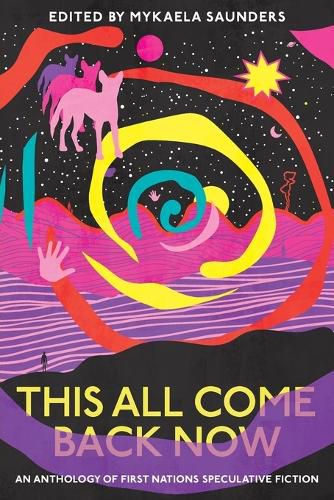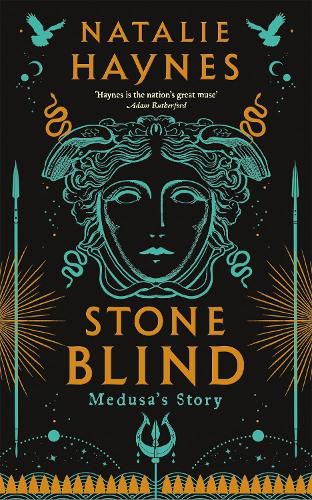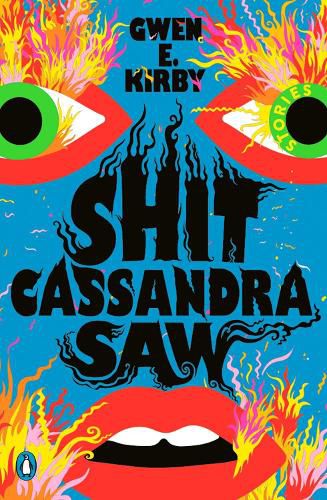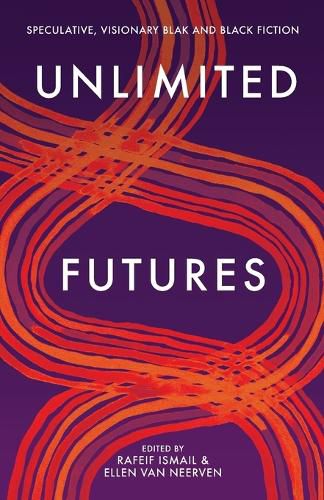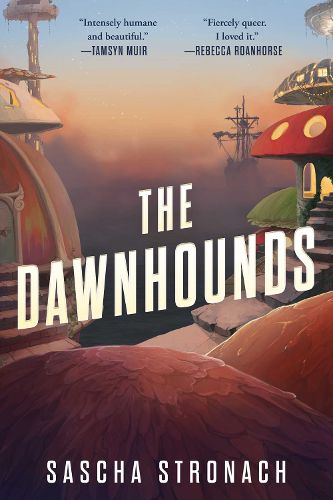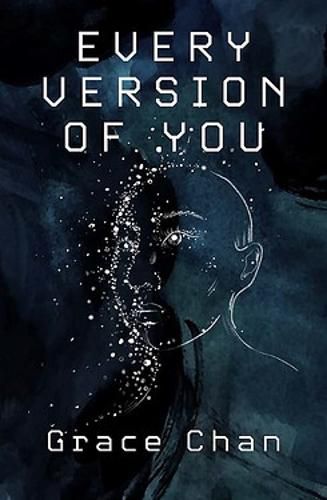2022 may be heralded as a Golden Age of Sci-Fi and Fantasy television, but it’s the books of the year that have truly excited the genre with innovation and imagination. From fiercely imagined First Nations speculative futures to the sexual politics of mythic retellings to radical historical fantasy, here are some of our favourites from 2022.
Babel by R.F. Kuang
Seated among the gleaming spires of 19th-century Oxford is the mighty Babel College where translators and silversmiths conjure magic through language, forging fuel for the churning engine of Empire. Into this world enters Robin Swift, an orphan boy from China whose aptitude with languages makes him a prized catch for the college – and for its enemies.
This vivid, explosive alt-history fantasy is Dark Academia at its finest, where obsessive days of study with tea and elderberry cordial give way to darker conspiracies and hard questions about complicity and colonialism. Babel is a towering work of imagination.
The Mountain in the Sea by Ray Nayler
Language features again in this exploration of the nature of consciousness. Marine biologist Ha Nguyen has agreed to research a newly discovered species of octopus on a remote Vietnamese archipelago controlled by a multinational corporation. Rumours say these hyperintelligent cephalopods have developed their own culture and language, but the more Ha tries to decipher them, the more her findings are subject to exploitation by competing interests in the wider world.
Questions of consciousness, selfhood and identity are deeply tangled in this taut work of hard science-fiction. Ray Nayler combines compelling characters, fascinating science and a startling, plausible vision of our near future in this grand and ambitious debut.
Our Wives Under the Sea by Julia Armfield
Those who love feeling caught up in an intricate web of language will relish the lush, languid beauty of Julia Armfield’s debut novel. Critically acclaimed for her short-story collection Salt Slow, Armfield skims elements of body horror and Gothic romance in this story about a woman whose wife returns from a disastrous deep-sea mission fundamentally changed.
In the vein of writers like Shirley Jackson and Angela Carter, Armfield draws on genre fiction’s capacity for atmosphere and horror to suffuse the reader with the characters’ feelings of grief, fear and love. The result is an entrancing queer Gothic tale that gives new meaning to the words sea change.
This All Come Back Now edited by Mykaela Saunders
What an amazing year it’s been for speculative fiction on this continent, with this glorious collection just one of several anthologies of First Nations writing (more on that later in the post). Edited by award-winning writer Mykaela Saunders, This All Come Back Now is written, curated, edited and designed by First Nations creatives, and features some previously published work, as well as wholly new stories.
With a line-up of writers that include Alexis Wright, Ellen van Neerven, Samuel Wagan Watson and Lisa Fuller (among many others), these stories span the deep past and futuristic what-may-bes, always centred on stories of communities and Culture.
Stone Blind by Natalie Haynes
The mortal daughter of a God and a human, Medusa grows up among her immortal family of Gorgons. When Poseidon attacks her in Athene’s temple, it is Medusa and not Poseidon who is punished, hurtling her into the path of the vicious supposed hero Perseus.
Author Natalie Haynes mines the myth of Medusa to rich effect, weaving a tapestry of themes that still resonate in the present day: feminism, victim blaming, power and hierarchy. Featuring a chorus of ancient Greek Gods and players depicted in all their pettiness, Haynes’ feminist retelling is rooted in humour, vengeance, and, of course, tragedy.
Shit Cassandra Saw by Gwen E. Kirby
This debut collection of playful irreverent stories about women at breaking point (a wholly relatable experience) has people likening this book to Margaret Atwood and Buffy. In Kirby’s rollicking, riotous mini-worlds, women are bitten by cockroaches and given superhero powers, a man’s online review of a restaurant transforms into a commentary on his marriage, and a woman told to smile reveals fangs – all the better to eat you with, my dear.
As demonstrated in story titles like ‘Shit Cassandra Saw That She Didn't Tell the Trojans Because at That Point Fuck Them Anyway’, Kirby’s wit and originality cuts sharp like a serrated blade.
Unlimited Futures edited by Rafeif Ismail, Ellen van Neerven and Hella Ibrahim
Edited by Rafeif Ismail and Ellen van Neerven (in conjunction with Hella Ibrahim of Djed Press), the second anthology on this list forms a conversation between local Blak and Black writing communities. Innovative and imaginative, the stories structure their visions of the future through a variety of engaging formats ranging from fiction and poetry to mock-newsletters and bilingual works. This is invigorating writing uninterested in placating its audience’s expectations, leaping across unexpected formats and raising challenging questions.
The Dawnhounds by Sascha Stronach
This queer, Māori-inspired debut fantasy follows a beat cop who is murdered, brought back to life with a mysterious new power, and tasked with protecting her city from an insidious evil threatening to destroy it.
‘Queer fungal-punk romp with all the world-building richness of China Mieville’s Bas-Lag novels,’ is how our bookseller describes Sascha Stronach’s exciting debut. It’s a fantastic example of rich worldbuilding inspired by non-European tropes and comes with the additional delight of recognising antipodean slang and vernacular in a fantasy novel.
The Daughter of Doctor Moreau by Silvia Moreno-Garcia
From the claustrophobic decaying horror of Mexican Gothic to the hardboiled mystery of Velvet Was the Night, author Silvia Moreno-Garcia is one of the most prolific and imaginative genre writers working today. Her latest novel continues to reinvent the canon, taking H.G. Wells’ Victorian classic The Island of Doctor Moreau and transposing it to the Yucatán peninsula in the 19th century.
Carlota Moreau is the only daughter of the mysterious Doctor, and has grown up in isolation surrounded by her father’s part human, part animal hybrid creations. But her cocooned existence is shattered with the arrival of Eduardo, the charming son of one of Moreau’s patrons. Filled with adventure, danger and even romance, this addictive concoction tackles Wells’ timeless questions of religion, scientific progress and class with a decidedly feminist, postcolonial twist.
Illuminations by Alan Moore
A paranormal study group is infiltrated by one of the otherworldly beings they seek to investigate; an older man’s visit to a seaside resort finds the past all too close at hand, the last lawyer left after the apocalypse hosts a surprising house showing. Just nine stories span the 400-plus pages of legendary comic writer Alan Moore’s first short-story collection, the centrepiece of which is the monumental 240-page novella ‘What We Can Know About Thunderman’, a dizzying, eviscerating deconstruction of the dreams and follies of the comics industry over 75 years.
Moore has lost none of his slippery weirdness in these genre-defying stories, his imagination squeezing surreal and fantastical moments out through the cracks of reality. This is writing oozing with horrified anticipation behind every delicious turn of phrase.
Every Version of You by Grace Chan
What is more important: embracing the digital potential of the future or upholding a more authentic past? This is just one of the thorny questions delicately unpicked by Grace Chan’s debut literary dystopia. The setting is late 21st-century Melbourne, and the city’s population is divided between those who choose to spend their lives in the virtual reality of Gaia and those determined to see out the climate-ravaged conditions of the ‘real’ world.
Chan’s exploration of reality and consciousness follows in the tradition of Ishiguro and Murakami, taking philosophical quandaries and rooting them in the specific grain of a character’s life. Infused with melancholic grief, this local debut heralds an exciting new Australian voice in speculative literary fiction.
Sundial by Catriona Ward
Rob fears for her daughters Callie and Annie, especially Callie who collects tiny bones and whispers to imaginary friends. When Callie’s interests threaten Annie’s safety however, Rob knows she has to take Callie back to Sundial – her creepy childhood home and the site of their family’s dark past.
Told from the dual perspectives of mother and daughter, this twisted psychological horror by the author of The Last House on Needless Street mines parent-child relationships to unsettling and unpredictable effect. With bold, expressive prose, Ward creates yet another unforgettable creepy thriller unafraid to blur the lines of morality.
Sea of Tranquility by Emily St John Mandel
Following on from Station Eleven and The Glass Hotel, Emily St John Mandel’s latest novel is yet another intelligent, tender exploration of humanity’s limits and its capacity for transcendence. A literary time-travel piece, Sea of Tranquility spans multiple timelines, locations and characters, from an author living on a moon colony preparing for a book tour on Earth to an Edwardian Englishman exiled in the rugged wilderness of British Columbia. Mandel fuses all these elements together into an intricate clockwork plot, blending it with lyrical prose to create a work of soaring imagination.
Honourable mentions:
- The Golden Enclaves (Scholomance, Book 3) by Naomi Novik
- Nona the Ninth (The Locked Tomb, Book 3) by Tamsyn Muir
- A Prayer for the Crown-Shy (A Monk and Robot Book, Book 2) by Becky Chambers


